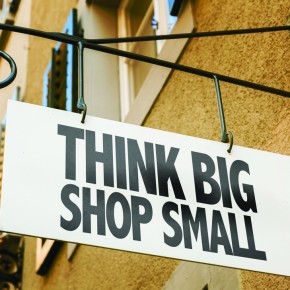 The first thing a customer sees before entering your business is your signage. Smart retailers understand that business begins with signage, and that proper signage should be displayed throughout your store location. Quality signage can help drive additional traffic and convey the brand message.
The first thing a customer sees before entering your business is your signage. Smart retailers understand that business begins with signage, and that proper signage should be displayed throughout your store location. Quality signage can help drive additional traffic and convey the brand message.
Business signage has a huge economic impact and plays an important role in retail. Think of your signage as the equivalent of your website landing page. It should be clear, engaging, and simple. As with your website, you can even conduct some A/B testing with some types of signage to see which performs best. For example, you can analyze just how effective your indoor signage is by testing it in a controlled environment (try not to test during a holiday, and make sure test variables are all the same).
In most cases, you’ll find that different signage has a positive impact on sales and store traffic. Here are five types of small business signage that you should have:
Storefront Signage
This is the most important signage of all; this is the introduction to your business. Your storefront signage says a lot about the type of business you own. Swirly, fun fonts could indicate a children’s store, while bold and black signage could represent something more on the serious side, like a car dealership. Choosing the right sign for your small business is one of the most important decisions you’ll make, as this decision will likely stick with you for years to come.
In addition to picking the right fonts, colors, and material, you’ll need to ensure your sign follows local zoning regulations and that you choose a sign that works well for the weather in your area. For example, a town that experiences heavy snowfall in the winter would need a more durable sign. If you’re having trouble deciding on the right aesthetic for your storefront design, check out these different business signs to give you some inspiration.
Persuasive Signage
Short snippets of persuasive images and words can draw a customer in. This can be anything from a “BOGO” promotional sign for shoes to an author book signing for a book store. Persuasive signage comes in many shapes and sizes, but all have the same goal of persuading your customers to take action. It can help draw attention to products, discounts, or services your customers may not have otherwise noticed. This is a great way to feature new or seasonal items or events.
Informational Signage
Informational signage helps people easily navigate your store without needing help from your employees. This is especially important on busy days, when your staff is busy helping customers or running a one-man show. Different types of informational signage includes directional, wayfinding, and organizational or departmental. Informational signage should be easy to read with simple colors and fonts. They help customers locate a certain section, bathroom, cash register, or other area of the store.
Outdoor Signage
Perfect for good weather, outdoor signage includes anything from sidewalk and window signs to awnings. This option is popular among restaurants and retailers and give potential customers a glimpse at what to expect before they walk in. Some outdoor signage is even able to convince passerby to walk in when they may not have otherwise. Because of its flexibility, you can feel free to get creative with your signage. If a funny message is in line with the brand, feel free to put out shareable signage that will make people laugh and keep them coming back for more.
ADA Compliant Signage
To avoid a crippling lawsuit, it’s critical to have proper ADA compliant signage in your store. This advises visitors that your store complies with the Americans with Disabilities Act and is accessible to everyone. Restrooms, cashier stations, and entryways should all be navigable by handicapped persons, or you could face serious consequences. Business owners should be well versed in compliant signage rules or work with a third party signage company or lawyer to ensure all boxes are checked.
There are many handicapped people who take advantage of small businesses who don’t have ADA compliant signage or accessibility. For example, one San Francisco-based handicapped man has sued thousands of businesses in the Bay Area. To avoid being in a sticky situation, be sure to cover all your bases.


